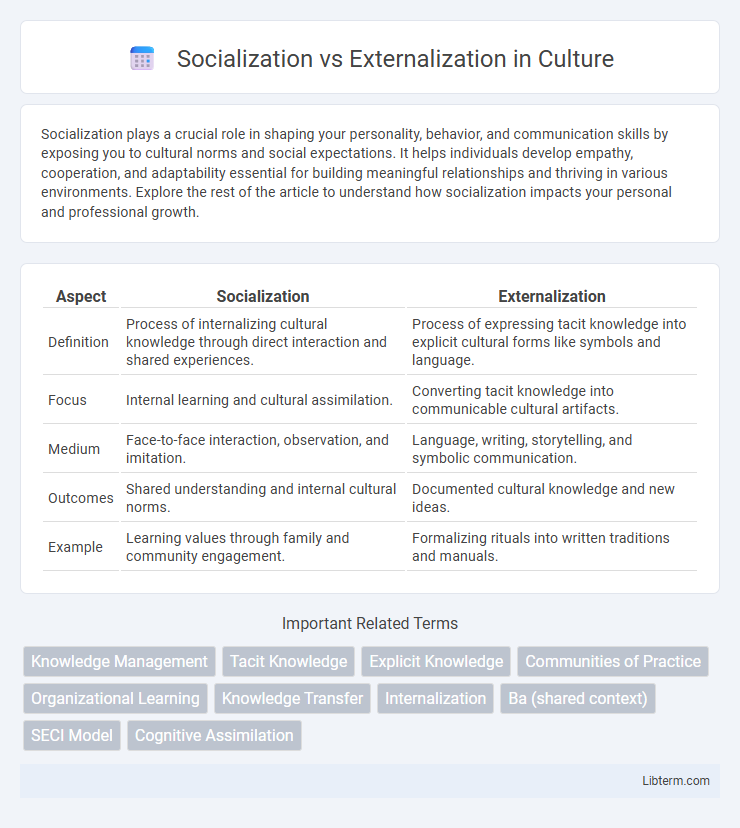Socialization plays a crucial role in shaping your personality, behavior, and communication skills by exposing you to cultural norms and social expectations. It helps individuals develop empathy, cooperation, and adaptability essential for building meaningful relationships and thriving in various environments. Explore the rest of the article to understand how socialization impacts your personal and professional growth.
Table of Comparison
| Aspect | Socialization | Externalization |
|---|---|---|
| Definition | Process of internalizing cultural knowledge through direct interaction and shared experiences. | Process of expressing tacit knowledge into explicit cultural forms like symbols and language. |
| Focus | Internal learning and cultural assimilation. | Converting tacit knowledge into communicable cultural artifacts. |
| Medium | Face-to-face interaction, observation, and imitation. | Language, writing, storytelling, and symbolic communication. |
| Outcomes | Shared understanding and internal cultural norms. | Documented cultural knowledge and new ideas. |
| Example | Learning values through family and community engagement. | Formalizing rituals into written traditions and manuals. |
Introduction to Socialization and Externalization
Socialization involves the process by which individuals internalize societal norms, values, and behaviors through direct interaction, shaping personal identity and social understanding. Externalization refers to the projection of internal thoughts, beliefs, and cultural meanings onto the external world, influencing collective knowledge and social structures. Both processes are fundamental in the construction and transmission of cultural knowledge within social systems.
Defining Socialization in Knowledge Management
Socialization in knowledge management refers to the process of sharing tacit knowledge through direct interaction and shared experiences, enabling individuals to internalize skills and insights collaboratively. It emphasizes the transfer of unarticulated expertise via observation, imitation, and practice within a community or organization. This method contrasts with externalization, which involves converting tacit knowledge into explicit concepts for documentation and wider dissemination.
Understanding Externalization: Key Concepts
Externalization in knowledge management involves converting tacit knowledge into explicit knowledge, enabling easier sharing and documentation. This process includes articulating personal experiences, insights, and skills into formal models, guidelines, or manuals that can be disseminated within organizations. Understanding externalization is crucial for fostering organizational learning, innovation, and collaboration by making implicit knowledge accessible and usable for a wider audience.
Core Differences Between Socialization and Externalization
Socialization involves the internal process of acquiring knowledge, norms, and values through interaction with others, shaping individual behavior within a society. Externalization refers to the act of projecting internal thoughts, beliefs, or cultural elements into the external world, often through communication or creation of artifacts. The core difference lies in socialization being an internalization mechanism influenced by social environments, whereas externalization is the outward expression or manifestation of these internalized experiences.
The Role of Tacit and Explicit Knowledge
Socialization involves the transfer of tacit knowledge through shared experiences and observation, enabling individuals to acquire skills and insights that are difficult to articulate. Externalization converts tacit knowledge into explicit knowledge by expressing ideas through documentation, models, or verbalization, making this knowledge accessible and transferable across different contexts. Mastery of these processes enhances organizational knowledge management by balancing intuitive understanding with formalized information.
Socialization: Methods and Best Practices
Socialization involves the process of sharing tacit knowledge through direct interaction, such as mentoring, storytelling, and collaborative activities that foster interpersonal connections. Best practices for socialization include encouraging open communication, creating informal learning environments, and promoting trust to facilitate knowledge exchange. Methods like apprenticeships, shadowing, and group discussions help embed experiential insights into organizational culture.
Externalization: Techniques and Tools
Externalization in knowledge management involves converting tacit knowledge into explicit knowledge through techniques like storytelling, concept mapping, and documentation. Tools such as mind-mapping software, collaborative platforms like Confluence, and digital whiteboards facilitate capturing and structuring internal ideas into shareable formats. Effective externalization enhances organizational learning by making expert insights accessible and fostering knowledge reuse.
Challenges in Socialization and Externalization
Challenges in socialization involve overcoming cultural and communication barriers that hinder effective knowledge sharing among team members. In externalization, the primary difficulties lie in accurately capturing tacit knowledge and converting it into explicit formats without losing context or depth. Both processes require strategies to ensure clarity, engagement, and the preservation of nuanced insights to facilitate organizational learning.
Case Studies: Real-life Applications
Case studies in socialization highlight how individuals acquire cultural norms through direct interaction, such as workplace onboarding programs that integrate new employees into organizational values and practices. Externalization is evidenced by real-life applications where personal knowledge is codified into formal systems, like software development teams translating tacit know-how into explicit documentation for broader use. These contrasting processes reveal the dynamic interplay between internalized social experiences and the external expression of knowledge within professional environments.
Conclusion: Integrating Both for Knowledge Success
Effective knowledge management hinges on the balanced integration of socialization and externalization processes, facilitating the seamless transformation of tacit knowledge into explicit knowledge and vice versa. Combining social interactions that foster shared understanding with deliberate efforts to articulate and document insights ensures comprehensive knowledge creation and dissemination. Organizations that strategically synchronize both modes achieve enhanced innovation, adaptability, and sustained competitive advantage.
Socialization Infographic

 libterm.com
libterm.com